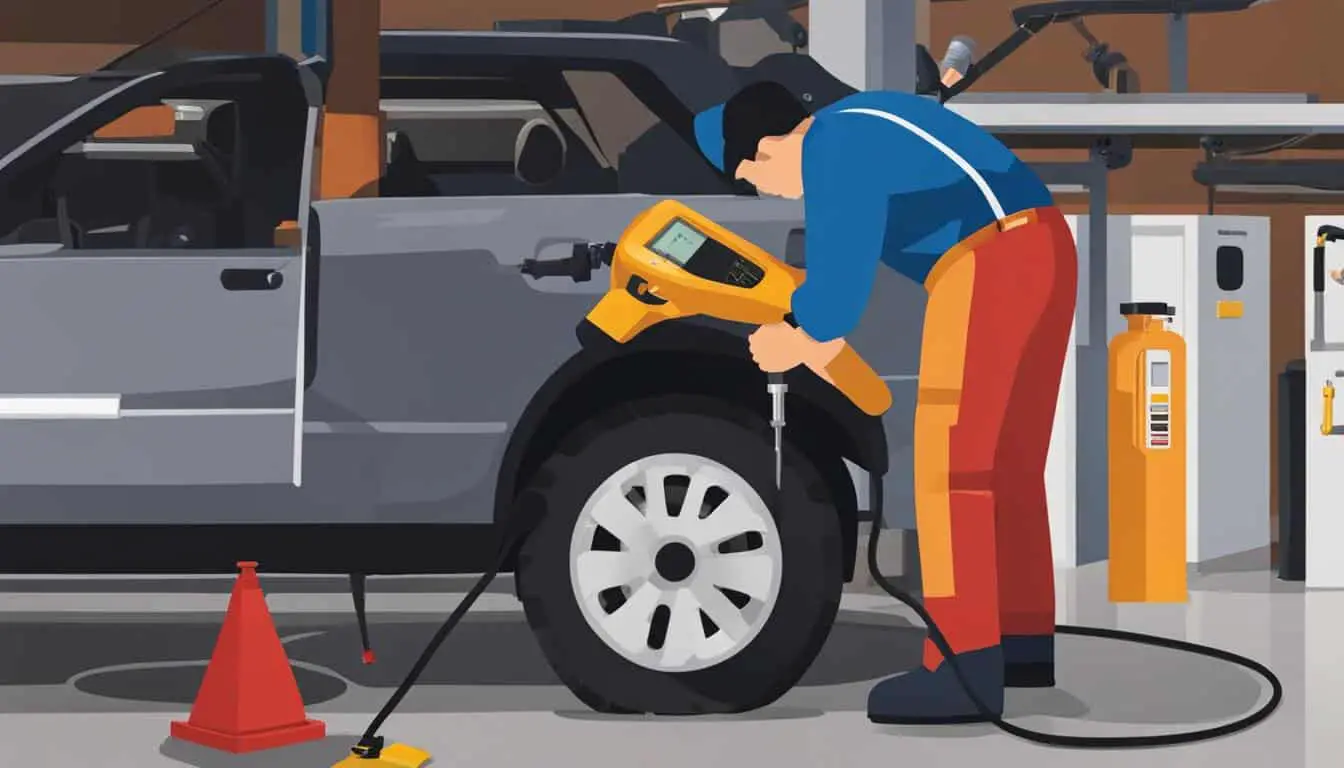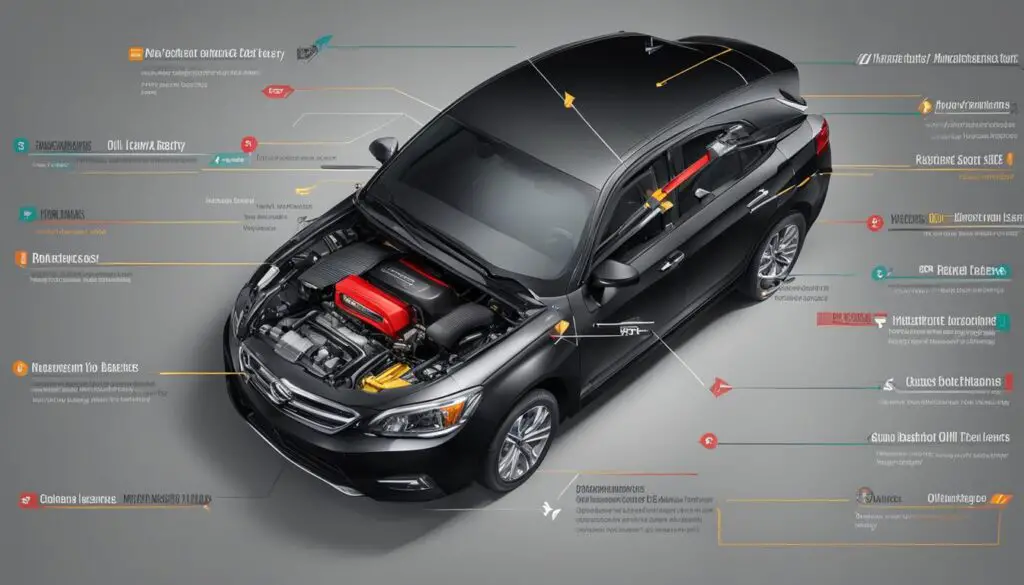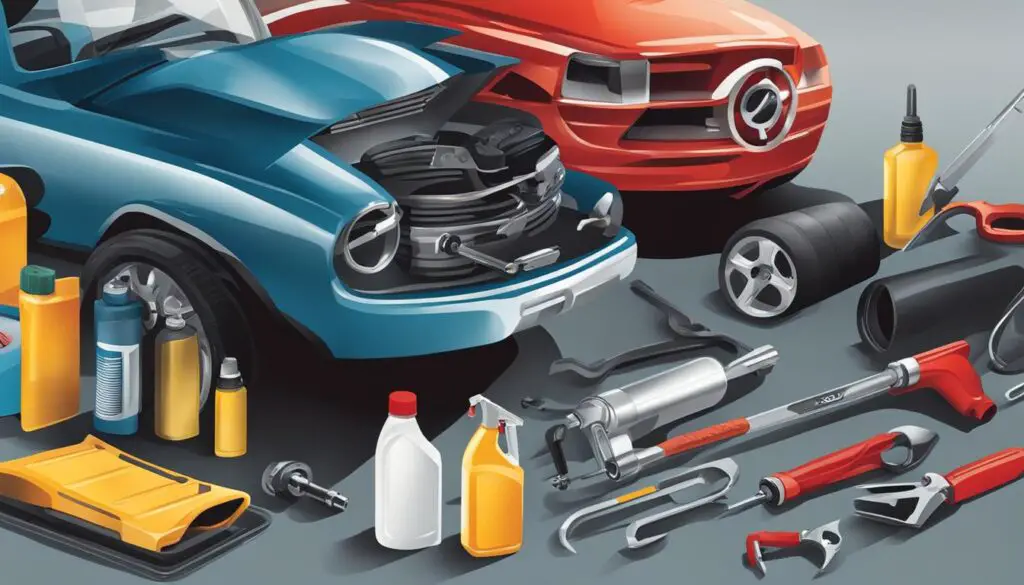
Beginner’s Guide to Basic Car Maintenance
Are you a new car owner or looking to improve your car maintenance skills? Basic car maintenance may seem daunting, but with the right knowledge and tools, anyone can keep their vehicle running smoothly and safely on U.S roads. In this article, I will provide a comprehensive beginner’s guide to basic car maintenance.
From checking fluids to inspecting brakes, performing basic car maintenance tasks can save you time and money in the long run. By following the tips in this guide, you’ll be able to confidently maintain your vehicle and avoid potential issues down the road.
Key Takeaways:
- Basic car maintenance is essential for safe and smooth driving on U.S roads.
- Checking fluids, changing tires, and inspecting brakes are fundamental tasks for car maintenance beginners.
- Regular maintenance can save you time and money on costly repairs in the long run.
- Understanding your vehicle’s owner manual can help you identify and prioritize necessary maintenance tasks.
- Don’t be afraid to seek professional help for more complex maintenance tasks.
Understanding the Basics of Car Maintenance
As a beginner, car maintenance can seem overwhelming, but with a few easy tips and some basic knowledge, you can keep your vehicle in top condition. In this section, I will provide simple and beginner-friendly car maintenance tips that every driver should know.
Firstly, it’s important to regularly check your car’s fluids. This includes oil, coolant, brake fluid, transmission fluid, and power steering fluid. By keeping an eye on these levels and topping them up when necessary, you’ll ensure your car’s engine and other systems operate smoothly.

Next, tire maintenance is another crucial aspect of car care. Make sure to routinely check tire pressure and inspect the tread for wear and tear. You can find the recommended tire pressure in your car’s owner manual or on the driver’s side door jamb. Proper tire maintenance not only improves safety, but also increases fuel efficiency.
Keeping your car clean is also essential for its maintenance. Regularly washing your car, both the exterior and interior, can prevent rust and damage over time. Additionally, a clean car is more comfortable to drive and improves overall driving experience.
Lastly, don’t overlook the importance of regular maintenance tasks like changing air filters, checking brake pads, and inspecting belts and hoses. These basic tasks are essential for keeping your car running smoothly and preventing potential issues down the road.
By following these simple and beginner-friendly car maintenance tips, you’ll be well on your way to keeping your vehicle in top condition. Remember, taking care of your car not only ensures a safe and smooth driving experience, but also increases the resale value of your vehicle should you decide to sell it in the future.
Essential Car Maintenance Tasks for Beginners
Regular car maintenance is essential for keeping your vehicle in optimal condition. As a beginner, it’s important to prioritize the following tasks to ensure that your car is safe and reliable on the road:
| Task | Frequency |
|---|---|
| Oil change | Every 3,000 miles or as recommended by the manufacturer |
| Check fluid levels | Monthly |
| Inspect brakes | Every 6 months or as recommended by the manufacturer |
| Rotate tires | Every 5,000 miles or as recommended by the manufacturer |
| Replace air filter | Annually |
It’s important to keep in mind that these are just general guidelines, and you should always refer to your vehicle’s owner manual for specific recommendations from the manufacturer.
Additionally, it’s important to be aware of any warning signs that indicate your car needs attention. For example, if you notice your brakes making unusual noises or your car’s engine running rough, it’s essential to address these issues promptly to prevent further damage and keep your car running smoothly.
By staying on top of these essential car maintenance tasks, you’ll be well-equipped to handle any issues that may arise and keep your car in top condition for years to come.

Conclusion
And there you have it, the beginner’s guide to basic car maintenance. By following these tips, you can keep your vehicle running smoothly and safely. Remember to regularly check and maintain your car, as neglecting basic car care can lead to costly repairs and potentially dangerous situations on the road.
It’s important to note that while these tips are useful for beginners, they are not all-encompassing. If you encounter any issues with your car that you’re unsure how to handle, don’t hesitate to seek professional help.
Thank you for taking the time to read this guide. I hope you found it informative and helpful in your car maintenance journey.
FAQ
How often should I change my car’s oil?
It is generally recommended to change your car’s oil every 3,000 to 5,000 miles or as specified in your vehicle’s owner’s manual.
What type of oil should I use for my car?
The type of oil you should use depends on your vehicle’s make and model. Consult your owner’s manual or ask a professional mechanic for the recommended oil type.
How frequently should I check my tire pressure?
It is recommended to check your tire pressure at least once a month to ensure proper inflation. Incorrect tire pressure can affect fuel efficiency and tire performance.
How often should I rotate my tires?
Tire rotation is typically recommended every 5,000 to 7,500 miles or as specified in your vehicle’s owner’s manual. Regular rotation helps ensure even wear and extends tire life.
What can I do to maintain my car’s battery?
To maintain your car’s battery, keep it clean and free of corrosion, ensure tight connections, and consider using a battery maintainer or charger if your car is parked for long periods.
Should I use distilled water for topping up my car’s battery?
It is recommended to use distilled water for topping up your car’s battery. This helps prevent mineral buildup and extends the life of the battery.
How often should I replace my car’s air filter?
The frequency of air filter replacement depends on various factors such as driving conditions and the type of filter. It is recommended to check your car’s air filter every 12,000 to 15,000 miles or as specified in your vehicle’s owner’s manual.
Do I need to warm up my car’s engine before driving?
Modern vehicles with fuel-injected engines do not require a long warm-up period. However, it is still beneficial to let your car idle for a short period to allow the engine oil to circulate before driving.
How often should I check my car’s brake fluid?
It is recommended to check your car’s brake fluid level every few months or as specified in your vehicle’s owner’s manual. Low brake fluid can indicate a leak or worn brake pads.
What should I do if my car’s check engine light comes on?
If your car’s check engine light comes on, it is recommended to have your vehicle diagnosed by a professional mechanic. Ignoring the light can lead to further damage and potentially costly repairs.
